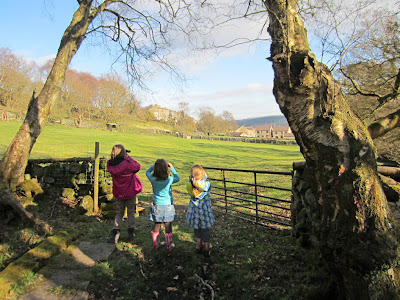One eagled-eyed spotter found a toad on a stone before we
even reached the wood. The toad was very well camouflaged; well done for
finding it.
Can you see it yet?
Common Toad
First we spent some time finding the numbered nestboxes and
marking their positions on a map. It took us a while to find nestbox number 6,
which was right in the middle of the wood! We checked to see if any birds were
using the boxes – none yet, but it’s early days…
Cameron, the Airedale Otters Leader, showed us an old Great Spotted Woodpecker nest he
had found.
Old Great Spotted Woodpecker nest hole
There are quite a few old nest holes in the trees in this wood
We then carried out a survey of the birds in the wood.
Wildlife surveys like this are very important in finding out what animals and
plants are living in a particular area. The information we gather can tell us
if the wildlife is doing well or not. This can help us make sure we are doing
the best things for wildlife conservation. We will compare our survey results to
one we will do later in the year, so you can see how things change between winter,
spring and summer once the migrant species have returned.
We found lots of birds, many just by listening for the calls.
Here’s a full list:
12 Wood Pigeon, 1 Collard Dove, 1 Wren, 4 Robin, 8 Blue Tit, 13 Great Tit, 4 Coal Tit, 3 Pheasant, 1 Nuthatch, 1 Jay, 2 Carrion Crow, 22 Jackdaw, 5 Magpie, 2 Chaffinch, 1 Greenfinch, 1 Song Thrush, 2 Dunnock, 1 Green Woodpecker, and 1 Buzzard.
12 Wood Pigeon, 1 Collard Dove, 1 Wren, 4 Robin, 8 Blue Tit, 13 Great Tit, 4 Coal Tit, 3 Pheasant, 1 Nuthatch, 1 Jay, 2 Carrion Crow, 22 Jackdaw, 5 Magpie, 2 Chaffinch, 1 Greenfinch, 1 Song Thrush, 2 Dunnock, 1 Green Woodpecker, and 1 Buzzard.
Watching the Pheasant
The highlights were the male Pheasant running across the
field looking very proud of himself, and the laughing call, or “yaffle”, of the
Green Woodpecker. As we made our way back to the meeting point we eventually
saw the Green Woodpecker fly across the field and land in a tree, but difficult
to see. Then one of the parents at the back of the group spotted a bird of prey
overhead – it was a Common Buzzard! They’re not very common in Harden! A
brilliant bird to spot.
One Airedale Otter spotted a Hawthorn Shield Bug, which had probably just come out of hibernation. The larvae (the young shield bugs) hatch in May and feed mainly on hawthorn berries, unsurprisingly!
Hawthorn Shield Bug
One Airedale Otter spotted a Hawthorn Shield Bug, which had probably just come out of hibernation. The larvae (the young shield bugs) hatch in May and feed mainly on hawthorn berries, unsurprisingly!
Ollie the Otter!
Did a Grey Squirrel make these scratches?
We also found really interesting scratch marks on a Holly
tree in the wood, which is probably the work of a Grey Squirrel. Well, we think
that’s what it is. We’ve been investigating and have asked some experts, but no-one
seems sure what could have caused it! Badgers? Deer? Rabbits? A chainsaw?!
We’ll ask the farmer for his help, and we may have to send a picture to BBC
Springwatch to see if they can help!
Quiz
At the end of the event we gave everyone a quiz about Otters. The quiz is open to all Airedale Otters members. Just complete the quiz by looking up the answers in
books or on the internet, and send it back to the Airedale Otters leaders. You
can hand in this completed sheet at the next meeting, or send your answers via
email. If you answer
enough of the questions correctly, we will send you a certificate to prove that
you really know all about otters! Good luck!
We will do
some more quizzes and practical tests in future, so you can earn more awards to
show you are a knowledgeable wildlife explorer.
Remember - spring is here, so keep an
eye out for birds building nests, and feeding young; and for birds returning
from migration, like Swallows, House Martins, and Chiffchaffs.








No comments:
Post a Comment